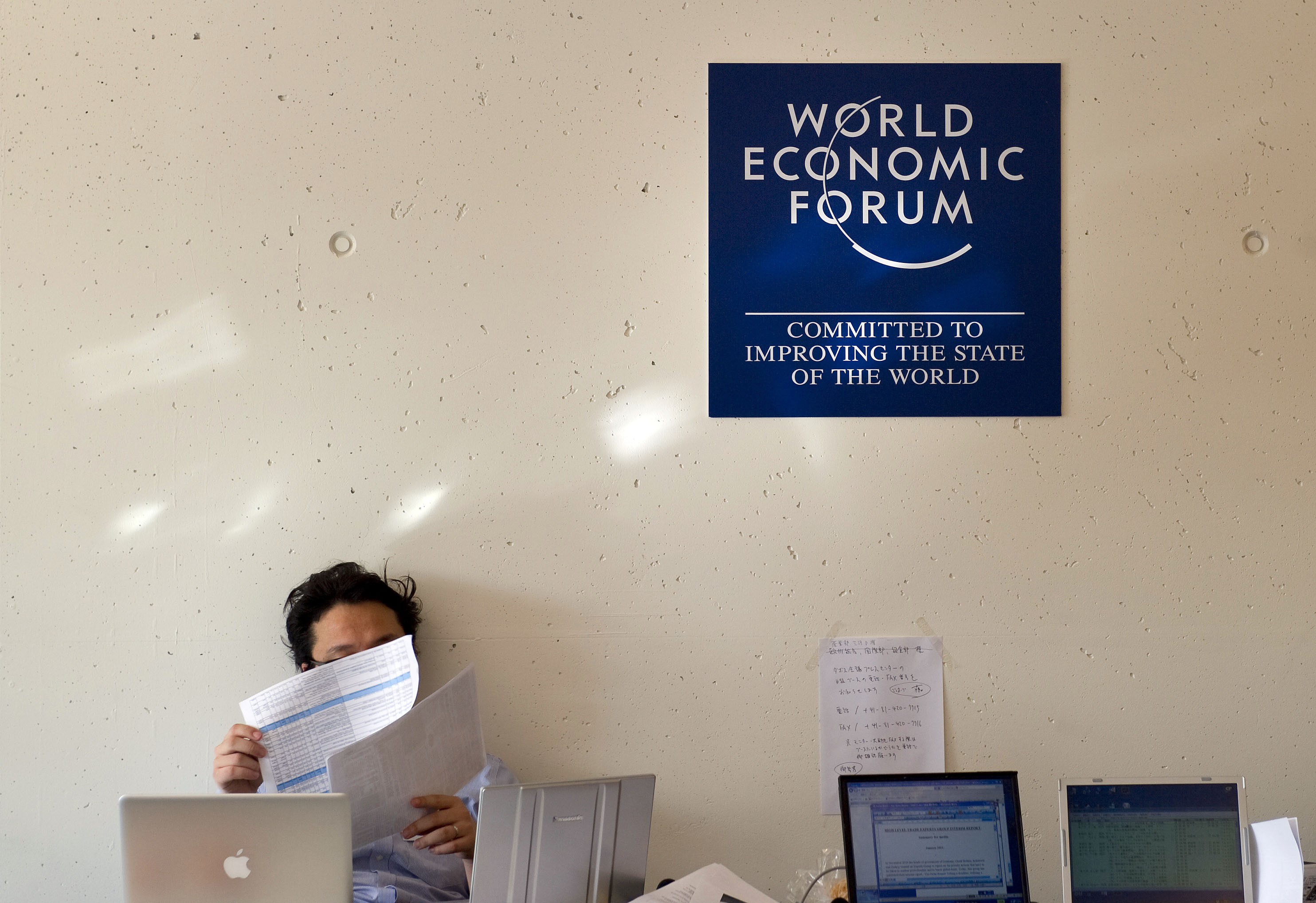Inertia reigns as elite return to Davos

Some of the world’s most influential leaders will be faced with a familiar set of unsolved problems during the World Economic Forum’s (WEF) annual meeting in Davos, following a year of economic and political stagnation.
Derided by some as being little more than a millionaire’s cocktail party indulging in empty rhetoric, the 43rd gathering of international movers and shakers will again talk about debt crises, rampant unemployment, environmental time bombs and irresponsible finance.
The lack of progress from last January even has WEF founder Klaus Schwab tearing his hair out while lamenting the tendency of many countries to look after their own interests at the expense of finding global solutions. “The fact is that we are still in some way blocked from making progress,” he told a press conference on January 15.
“My hope is that we can approach our global affairs with more optimism. I hope that participants come away…feeling a greater responsibility for society as a whole.”
The title of this year’s WEF Davos meeting – “Resilient Dynamism” – is in itself a misnomer according to Greenpeace Switzerland, which will co-present the Public Eye Award to the “worst company of the year” in Davos once the WEF conference is in full swing.
The five most likely risks to the world, according to WEF’s panel of experts:
Severe income disparity
Chronic fiscal imbalances
Rising greenhouse gas emissions
Water supply crisis
Mismanagement of population ageing
Problems remain
“Governments and the corporate world are showing great resilience against change but still little positive dynamism,” Michael Baumgartner, head of corporate accountability at Greenpeace Switzerland, told swissinfo.ch.
“If corporations would simply stop creating some of the world’s largest social and ecological problems the rest of us would not have to try to solve them. Solutions can only come via a bottom up approach, with people raising their voices.”
Economically and politically, the world appeared to have stagnated in 2012. Despite the Arab Spring revolution that gripped the Davos conference two years ago, huge problems still exist in Libya, Egypt and particularly Syria.
The global economy inched forwards by 2.3 per cent last year, according to the World Bank, but the leaders of growth, principally China, slowed down. The European Union is still mired in debt and decisionmaking conflict, while politicians in the United States continue to bicker as the country heads towards insolvency.
Financial scandals continued to proliferate among big banks, no less so in Switzerland than in any other part of the world.
And WEF’s own Global Risks Report, released earlier this month, highlights an increased risk of environmental catastrophes as some countries turn their backs on ecological commitments in order to boost economic growth.

More
Artistic dig at resort hosting World Economic Forum
Global template?
Switzerland, as host nation to the Davos summit, is held up by some as an example of how to show resilience to shocks, standing as an island of stability amid huge upheaval all around.
Having survived the financial crisis and economic downturn with greater fortitude than most advanced economies, Switzerland is forecast to achieve economic growth of around 1.3 per cent this year – against a slight retraction in the eurozone. Unemployment rates should also remain significantly lower than in most peer nations.
Switzerland was named the most stable place in the world by economics guru Nassim Nicholas Taleb in his recent book, Antifragile.
However, Switzerland is still facing many of the problems identified in the WEF Global Risks report.
The recent financial crisis and declining influence of the G8 mean the WEF has inevitably become less relevant, argues Flávio Aguiar, a Brazilian writer and professor at the University of São Paulo.
“The structure that supports the Davos forum and its underlying ideas of dominancy went into crisis and its loss of prestige became inevitable, both in Brazil and in other countries. The ideology that fueled the forum is still alive and dominant in the European Union, but it is contested by heavyweight economists like Paul Krugman and Joseph Stiglitz, as well as the growing discontent witnessed in Europe,” he commented.
“The WEF’s decline was accentuated by the outbreak of the financial and economic crisis in 2007-2008, which undermined belief in many of its ideas and in the credibility of many of its patrons.”
But the WEF is not alone in this respect. He says the prestige of the G8 has also nosedived “if you look at its eight members, five have experienced – and continue to experience – deep crises … What’s more, two of the eight largest global economies, Brazil and China, are not formally represented in the G8 group. Since 2008 the G20 has become the world’s most important forum for discussing the global economic agenda.”
To boldly go…
Growing income disparity has prompted an initiative aimed at curbing excessive pay in Switzerland, with voters to decide in March. The annual Worry Barometer, produced by Credit Suisse bank late last year, revealed the biggest fear of the Swiss population to be losing their jobs.
The continued scandals at UBS bank, along with ongoing tax evasion disputes, have prompted fears about the resilience of the financial sector, while the industry frets about the consequences of ever tougher regulations.
“In order to deal with risk you have to take risks. Leaders need to be more innovative and bolder,” WEF Managing Director Lee Howell told journalists at the organisation’s headquarters in Cologny, canton Geneva.
The underlying message was clear: the world’s political and business leaders need to work together to solve problems rather than continue to act in their own interests.
The WEF was started by Klaus Schwab in 1971 at Davos, initially under the name “European Management Symposium”.
It was designed to connect European business leaders to their counterparts in the United States to find ways of boosting connections and solving problems.
It is a non-profit organisation with headquarters in Geneva and is funded by the varying subscription fees of its members.
The forum took its current name in 1987 as it broadened its horizons to provide a platform for finding solutions to international disputes. WEF claims to have helped calm disputes between Turkey and Greece, North and South Korea, East and West Germany and in South Africa during the apartheid regime.
WEF conducts detailed global and country-specific reports and conducts other research for its members. It also hosts a number of annual meetings – the flagship being Davos at the beginning of each year.
In 2002, this meeting was moved to New York for a one-off change of venue to support the city following the 9/11 terrorist attacks of the previous year.
Davos has attracted a number of big names in the world of business, academia, politics and show business. These include: Nelson Mandela, Bill Clinton, Tony Blair, Bono, Angela Merkel, Bill Gates and Sharon Stone.
As the forum grew in size and status in the 1990s, it attracted rising criticism from anti-globalisation groups, complaining of elitism and self-interest among participants.
This year, the Davos summit will run from January 23-27. Some 2,500 participants will listen to leaders from the worlds of politics, business, finance, civil society, religion, culture and science.
Some 50 heads of state will attend, including British Prime Minister David Cameron, Russian Prime Minister Dmitri Medvedev, German Chancellor Angela Merkel and Italian Prime Minister Mario Monti.
An average of 3,300 soldiers a day will look after WEF security at a cost of SFr28.5 million ($30.7 million). This is the same number of soldiers as the previous two years.
More than 90% of the soldiers mobilised will be reservists. The head of the operation said all of them will have received training and passed an exam.

In compliance with the JTI standards
More: SWI swissinfo.ch certified by the Journalism Trust Initiative

You can find an overview of ongoing debates with our journalists here. Please join us!
If you want to start a conversation about a topic raised in this article or want to report factual errors, email us at english@swissinfo.ch.